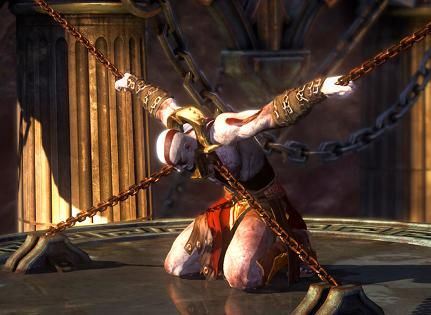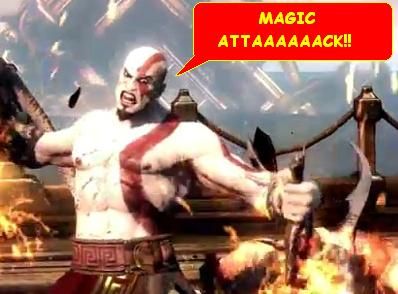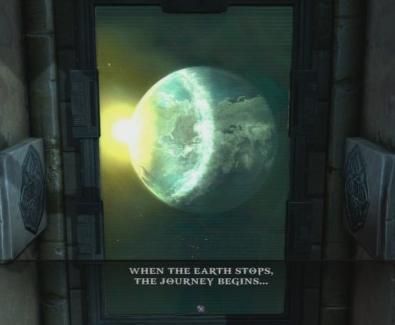
In terms of it's visual prowess, it's hard to argue that Ascension is not the prettiest entry in the series. It's downright beautiful throughout, and even manages to one-up God of War 3 time after time in terms of the magic your eyes will feast on as you play. That being said, those good looks are not really invested in a lot of compelling places to visit. Some locations, like throughout the massive Statue of Apollo, or in the early portions of the Hekatonkheires, are a sight to behold - but other locations, like the snowy caps of...whatever those mechanical snakes were about...didn't really cement their place as some of the series' most awesome places to visit and kill things in.
One thing Ascension does do to try and break from tradition is liberally change up how Kratos' combat and magic work. It's actually fairly drastic if you've been following the game, and alters everything from blocking, to parrying, to magic, and even when unleashing your Rage Meter. Like much of Ascension, however, the changes are not all for the best.
I actually like how the Rage Meter works now. Instead of triggering it and become more powerful and invulnerable for a few seconds, you now unleash a super-powered attack depending on what element you have fueled you blades with (Ares' fire, Poseidon's ice, Zeus' lightning, or Hades' souls). These attacks are really cool, and more often than not, hearken back to some other attack seen in previous GoW games. The element angle also changes up how magic is earned and used. No longer do you just get to some point in the story and unlock a new magic ability. Instead, you have to use your EXP to unlock the last level of each element to earn its magic. To be fair, I only used two magic spells throughout the entire game, and that's only because it took so long to get enough EXP to unlock them all.

Ascension does finally concede that the only weapon you need or care about are the Blades of Chaos, and I appreciate that. Secondary weapons can be found throughout levels, or stolen from enemies, and they can be used in combos - but I still stuck primarily to the Blades. Wasting time on other weapons always felt like a joke in these games. The exception being the Neamean Cestus from GoW3. Those were sweet.
In terms of the game itself, Ascension has a hard time explaining why it even needs to be. Visiting Kratos only six months after the slaughter of his wife and child, we learn about how Kratos was able to break his oath to serve Ares by killing the three Furies - three demonic sisters who punish those who break their oaths, especially to the Gods. Problem is, this story isn't important. It doesn't bring anything new to the table regarding Kratos. Did we need to know about this? Was how Kratos defied Ares ever a really point of contention and debate? I always pictured a big middle finger and off he went... Worse yet, the Furies are not compelling villains. They're pretty weak compared to any other force Kratos has had to deal with, and seem like a watered-down version of the Sisters of Fate, who still had a better boss battle...
Since God of War 2's battle against the Colossus of Rhodes, each game has tried to kick up the first boss battle by bringing something bigger and more bad-ass to the table. Ascension, which featuring an ongoing battle against pieces of the Hekatonkeires, is massive in size and scope - but there's something about it that lacks the general punch of fighting the Colossus, and comes nowhere close to the "oh shit" feeling of taking on Poseidon's watery form in GoW3. It's big and pretty and horrible, but there's an odd disconnect from it. There's a similar feeling towards the end of the game against another massive boss. It's very nice to look at, and a huge battle - but it doesn't hold the weight of previous challenges.
When the game ends, no new revelations were made. There seems to be this "oh snap!" point where we discover how Kratos truly became tortured by memories of his past, but it's not that big a deal, and as a reveal, it's devoid of impact. The game doesn't even get around to explaining how Kratos ended up with Athena as his guide. Not every single unknown has to be explored, but if you're going to try, try harder. Hey, Kratos didn't have his trademark tattoo in the flashbacks of Ghost of Sparta, should we invest in a game where he gets it!? NO! Thankfully, if anything, Ascension's story doesn't screw with the established canon. The story is extremely self-contained, and is left to either deal with it's own tale, or foreshadow events that played out in the previous games - with one exception about, maybe, the future of the series.

In the end, Ascension is a good game, but it doesn't serve a real purpose for fans other than giving you another go-round as everyone's favorite angry Spartan, and it has these times that swing between bringing truly epic moments to the table, and feeling a bit dodgy and oddly rough around the edges - a lot like the original God of War, I felt. While the story likes to proclaim that "before he was a god, he was a man", and tug at the heart-strings with thoughts of those loved ones he has lost (still because of his own actions, which the game wants to tell you wasn't the case, but still really was), the truth is that Chains of Olympus made a much more emotional impact with Kratos and his daughter. It did what Ascension wants to, and better.
God of War is too important to Sony to just curl up and die - and I don't want it to anyways, because I truly love these games, but there has to be a different direction to go from here. There's a ten year gap between Kratos making his pact to Ares and the events of the first God of War, and the thought of a decades-worth of prequels absolutely terrifies me. There's really only two places to go from here - continue from where God of War 3 left off (somehow developing a fiction where the Greek Gods are dead and gone, maybe explore that weird Athena ghost a little or soemthing - and preferably with an old Kratos, complete with kick-ass beard, and missing an eye or something), or reboot it, and take the series into a new mythology, even if that means having a new protagonist at the helm.
oooo Bannen's back and he's hot!
ReplyDelete